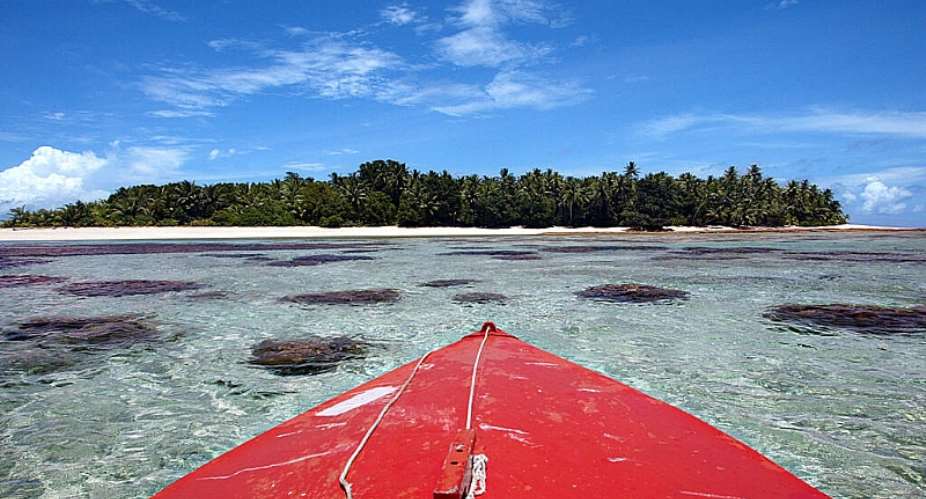Climate negotiators are meeting for the first time since the world agreed a dedicated loss and damage fund to help vulnerable nations on the frontlines of climate change respond to climate shocks such as extreme weather and rising sea levels, which pose an existential threat.
A key task at the Bonn Climate Change Conference, which began on Monday and will run though to 15 June, will be deciding how that fund should operate – a scheme that will then be put forward for adoption at this year's Cop28 in Dubai.
While the latest IPCC report shows loss and damage is already affecting every region of the world , the worst consequences are being felt by those least responsible for climate change: developing nations and small island states.
People living on the frontlines of climate change have already sustained massive losses and damages as a result of extreme temperatures, tropical storms, floods, droughts, wildfires and rising sea levels – and are spending large sums of money to rebuild and adapt.
Fight for survival
The United Nations has warned that rising seas – perhaps the most severe consequence of the climate crisis – are already creating new sources of instability and conflict. In the coming decades, it says, low-lying communities and even entire countries could disappear forever.
Tuvalu, for example, is forecast to be under water by the end of the century. The average height of its nine islands is less than two metres above sea level, and already up to 40 percent of the capital district is submerged at high tide.
The existential threat posed to these island states raises important legal questions about national sovereignty, says François Gemenne, a specialist of environmental geopolitics and migration governance at the University of Liège.
“ Does a country like Tuvalu continue to exist as a state … in the absence of a physical country?” he asks. “ If the state disappears under the effects of climate change, will its population become stateless?”
The concept of a "virtual state", which Tuvalu is already seeking to become by building a digital version of itself – replicating islands and landmarks and preserving its history and culture – implies decoupling the concept of state and territory.
'Mass exodus'
A recent study mapp ing sea level hotspots around the globe found that sea level rise this century risked disproportionately affecting certain Asian megacities, western Pacific islands and the western Indian Ocean.
Meanwhile a further t wo s tudies are warning of sea level rise that i s “unprecedented in at least 120 years” along the Gulf of Mexico and south-eastern coast of the United States.
Nine hundred million people – one out of every 10 people on earth – live in coastal zones at low elevations, and climate shocks have already forc ed people to relocate in Tuvalu, Fiji, Vanuatu, the Maldives and elsewhere.
Secretary General Antonio Guterres has warned of a “mass exodus of entire populations on a biblical scale” and of fierce competition for fresh water, land and other resources.
“ People's human rights do not disappear because their homes do,” he said .





 SSNIT must be managed without gov’t interference – Austin Gamey
SSNIT must be managed without gov’t interference – Austin Gamey
 Ejisu by-election could go either way between NPP and independent candidate — Gl...
Ejisu by-election could go either way between NPP and independent candidate — Gl...
 We never asked ministers, DCEs to bring NPP apparatchiks for returning officer r...
We never asked ministers, DCEs to bring NPP apparatchiks for returning officer r...
 No one denigrated the commission when you appointed NDC sympathizers during your...
No one denigrated the commission when you appointed NDC sympathizers during your...
 Used cloth dealers protests over delayed Kumasi Central Market project
Used cloth dealers protests over delayed Kumasi Central Market project
 A/R: Kwadaso onion market traders refuse to relocate to new site
A/R: Kwadaso onion market traders refuse to relocate to new site
 Dumsor: Corn mill operators at Kaneshie market face financial crisis
Dumsor: Corn mill operators at Kaneshie market face financial crisis
 Jamestown fishermen seek support over destruction of canoes by Tuesday's heavy d...
Jamestown fishermen seek support over destruction of canoes by Tuesday's heavy d...
 Election 2024: EC to commence voter registration exercise on May 7
Election 2024: EC to commence voter registration exercise on May 7
 Public schools rebranding: We’re switching to blue and white, we’re painting all...
Public schools rebranding: We’re switching to blue and white, we’re painting all...
